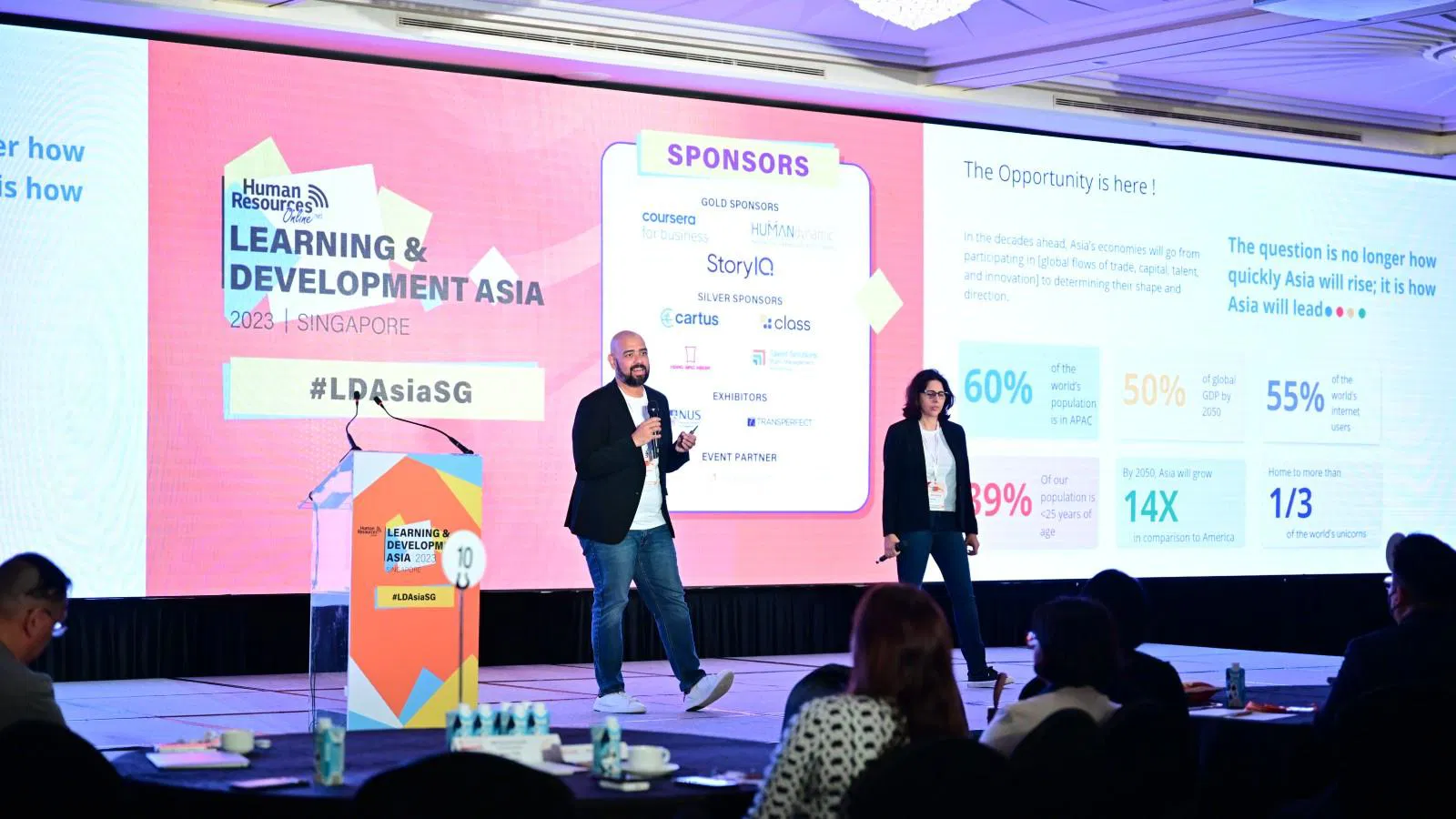share on
Key L&D trends you need to know – from the matching skill sets needed to accompany the changing mindset, to judging how your talent will perform in bigger, more complex, and unfamiliar leadership roles. Event report by Arina Sofiah.
Asia's economies are growing — and so is the future of work.
With opportunities for growth presenting themselves, what sort of leader would we require to unlock the potential Asia has to offer? This was the question that kickstarted day two of the Learning and Development Asia 2023 conference here in Singapore. The two-day conference, held on 6-7 September at Equarius Hotel, saw close to 160 leading learning practitioners, CHROs, CLOs, and thought leaders from the L&D community share insights on future-proofing the organisation in times of uncertainty.
Highlights on the sessions from day two are shared below:
Exploring the critical skills for leaders in 2030
To start, there were four critical elements identified in one of the sessions, defining future of work:
- Culture
- Belonging, trust, transparency, and learning will continue to impact how to attract and retain talent
- The physical workplace will remain fluid
- Technology will inform business models and the employee experience
- Demand for purpose-driven work
- It's no longer about the best leader in the world, but the best leader for the world
Along with these four influencing factors comes matching skill sets to accompany the mindset elements:
- Inspiring followership
- Innovation culture
- Communication
- Leadership agility
- Fail fast and forward
As summarised by our speakers: "If mindsets are the beliefs and mental models, then skills are the ability to create those experiences."
Now, against this rapid change, how do you cultivate a talent philosophy to future proof your organisation? As we learnt in another session, start by asking two key talent strategy questions:
- What are the few differentiating capabilities that your company will need to beat the competition in the future?
- What is the gap between that reality and where you are today?
To proceed with execution however, it is important to keep in mind the different challenges and different needs.
In your talent philosophy, judging how talent will perform in bigger, more complex, and unfamiliar leadership roles may be tough. According to our speaker, this is the foundation for individual L&D plans:
First, look at experience:
- Variety
- Diversity
- Adversity
- Intensity
Second, intellectual horsepower:
- How quickly does this person get to a sound point of view on a complex issue?
- Do they make the complex simple? When they explain things, how easy are they to understand?
Third, will they excel in unfamiliar leadership roles?
- Have you regularly put them in very unfamiliar situations, and have they beaten the odds and figured out what to do?
- How does this person deal with ambiguity? Are they comfortable when things are up in the air and the environment is grey?
- Are they really “smooth” with people? Can they size up people quickly? Are they comfortable walking in to a hornet’s nest and finding common ground?
- Do they thrive on change? Do they create broad and deep followership during times of change?
- Do they always get results against all odds? Are they resourceful? Do they inspire others?
These were just part of the wealth of insights shared at LDA 2023 this year in Singapore. Other insights shared include:
Managing a multigenerational workforce and strategies for future leadership needs
- The defining worldview of all the working generations and how this translates into their work expectations, learning style, and more.
- The spanner to prepare for: Generation Alpha
Tackling the evolving role of the CLO in navigating today’s learning landscape
- With skills and competencies changing rapidly, the way we learn needs to change as well. Learning therefore needs to be in the flow of work.
- Gone are the days of six- or nine-month programmes, simply because of how rapidly things are changing.
- Moving to building self-directed learning culture and ecosystem, and equipping leaders to take what they need.
- This turns learning more into curation than creation.
Four findings on the role of L&D in supporting the company’s sustainability agenda
- Finding one: Drive authentic purpose.
- Finding two: Focus on sustainability culture and employees first
- Finding three: Common language and knowledge of sustainability goals is critical
- Finding four: Turn passion into action
Human Resources Online would like to thank all speakers, moderators, panellists, Leadership Exchange facilitators, and attendees for being valuable contributors to this event.
We would also like to extend our gratitude to our sponsors & partners for making this conference possible:
GOLD SPONSORS
Coursera
Human Dynamic Asia Pacific
StoryIQ
SILVER SPONSORS
Cartus
Class
Hong Bao Media
Talent Solutions
EXHIBITORS
National University of Singapore (NUS)
TransPerfect
Event Partner
Pigeonhole Live
Lead image / Human Resources Online
share on


